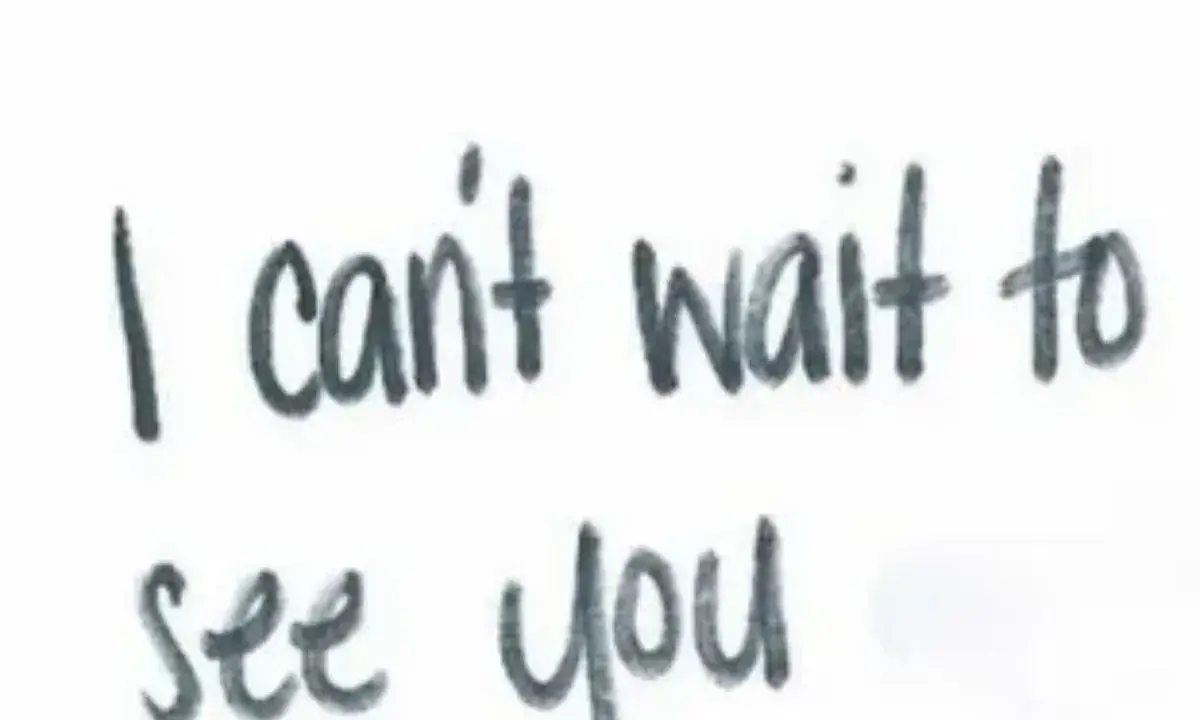Few phrases capture excitement and affection as perfectly as “I can’t wait to see you.” Whether it’s whispered in a late-night text, said before a long-awaited reunion, or shared in passing, those six words carry a powerful mix of anticipation, intimacy, and emotional connection.
This guide explores the meaning, psychology, cultural impact, and best replies to “I can’t wait to see you.” It blends relationship insights, real-life examples, and over 300 responses you can use in any situation—romantic, playful, friendly, or professional.
The Meaning Behind “I Can’t Wait to See You”
At its core, this phrase goes beyond simply saying “See you soon.” It communicates:
- Anticipation – showing eagerness for the upcoming moment.
- Affection – making the other person feel valued and cherished.
- Priority – signaling that the meeting or reunion matters deeply.
Depending on context, “I can’t wait to see you” can mean:
- Romantic: longing to reconnect with a partner.
- Friendly: genuine excitement to catch up with a friend.
- Family: joy in anticipating family reunions.
- Professional: enthusiasm for an upcoming meeting or collaboration.
This versatility explains why the phrase appears across texts, calls, and even professional emails.
The Emotional Impact of Anticipation
When someone says, “I can’t wait to see you,” they’re tapping into the psychology of anticipation.
According to the American Psychological Association, anticipation releases dopamine—the “feel-good” neurotransmitter that sparks motivation and joy. This is why looking forward to an event often feels just as rewarding as the event itself.
Key emotional effects:
- Builds positive energy leading up to a meeting.
- Creates a sense of importance—you matter enough for someone to be excited about you.
- Reduces feelings of distance in long-distance relationships.
- Encourages commitment and reassurance in couples and families.
How “I Can’t Wait to See You” Strengthens Bonds
Language is one of the strongest tools for nurturing connection. A simple phrase can:
- Reassure a partner they are missed and valued.
- Deepen intimacy by expressing genuine longing.
- Strengthen family ties by highlighting closeness.
- Reinforce friendships through shared anticipation.
“Words are not just words; they are bridges.” – A relationship coach once said that small phrases like this create emotional bridges between people, keeping them connected across time and space.
The Science of Waiting and Anticipation
Waiting is not just an emotional process—it’s biological.
What science tells us:
- Dopamine and reward system: The brain releases dopamine in anticipation of rewards, making waiting enjoyable.
- Delayed gratification: Studies show anticipation often heightens satisfaction when the moment finally arrives.
- Relationship studies: Long-distance couples report stronger bonds when they regularly share anticipatory messages like “I can’t wait to see you.”
Case Study: Military families often use anticipation-based phrases during deployments. Research in the Journal of Family Communication highlights how anticipatory language helps couples cope with distance and separation anxiety.
When to Use “I Can’t Wait to See You”
Like any phrase, context matters.
Best times to use it:
- Before a date night or special event.
- While planning a family gathering.
- In professional settings, when showing genuine enthusiasm about collaboration.
When to avoid it:
- Too early in a relationship—it may feel overwhelming.
- In strictly formal work contexts—it may appear unprofessional.
Pro Tip: Tailor the tone. A romantic partner may want a passionate version, while a colleague may prefer “I’m really looking forward to our meeting.”
Different Ways to Express Excitement
Sometimes, you want to change it up. Here are some alternatives:
- “Counting down the days until I see you.”
- “I’m so excited for our time together.”
- “Looking forward to hugging you soon.”
- “It feels like forever—I miss you.”
In other languages:
| Language | Translation |
|---|---|
| Spanish | No puedo esperar a verte |
| French | J’ai hâte de te voir |
| German | Ich kann es kaum erwarten, dich zu sehen |
| Italian | Non vedo l’ora di vederti |
| Portuguese | Mal posso esperar para te ver |
Crafting the Perfect Message
A great message is both personal and contextual.
Tips:
- Add specific details: “I can’t wait to see you at the concert Friday.”
- Match the tone: romantic, casual, professional.
- Keep it authentic—don’t exaggerate.
Example: Instead of a plain “I can’t wait to see you,” say:
- “I can’t wait to wrap you in my arms tomorrow night.”
- “Looking forward to catching up over coffee next week.”
300+ Replies to “I Can’t Wait to See You”
Here’s a categorized collection of responses for any situation.
Romantic & Loving Replies
- “Neither can I, my love. Counting the hours.”
- “You’re always worth the wait.”
- “I dream about holding you again.”
Sweet & Heartfelt Responses
- “Same here! I’ve missed you so much.”
- “Seeing you will make my week.”
- “I’m smiling just thinking about it.”
Playful & Fun Replies
- “You better bring snacks when you come!”
- “Hope you’re ready for all the hugs.”
- “Don’t make me wait too long!”
Flirty Responses
- “I can’t wait to kiss you either.”
- “Should I warn the neighbors about us?”
- “Get ready—I’m not letting you go.”
Casual & Friendly Replies
- “Me too, it’s been too long!”
- “Looking forward to hanging out.”
- “We’ll have a blast, promise.”
Excited & Eager Replies
- “Just a few more sleeps!”
- “The countdown is real.”
- “I’m bouncing off the walls already.”
Witty & Funny Responses
- “Careful, you might regret saying that.”
- “Finally! My jokes need an audience.”
- “Don’t be late, I’m impatient.”
Creative & Unique Responses
- “Our reunion should be a holiday.”
- “I’m composing a happy dance already.”
- “The stars aren’t as bright as this wait.”
Specialized Expressions & Variations
- “I can’t wait to be in your arms” – deep romantic longing.
- “I can’t wait to see you my love” – affectionate emphasis.
- “I can’t wait to see you again” – reunion after time apart.
- Song lyrics:
- “Can’t Wait to See You Again” – Nu Flavor
- “I Can’t Wait to See You Smile” – Train
- Quotes for him/her:
- “Distance means nothing when someone means everything.”
- “Every mile apart just makes me love you more.”
How to Respond to “I Can’t Wait to See You”
General Tips
- Match enthusiasm – show equal excitement.
- Adjust tone – romantic, casual, or professional.
- Keep it short and genuine.
Text Response Examples
- “Same here, I’m literally counting hours.”
- “Your words just made my day.”
- “I can’t wait either—what should we do first?”
Casual/Professional Examples
- “Me too, looking forward to our meeting.”
- “Excited to see how this project shapes up.”
Quick List of Best Replies
- “You always know how to make me smile.”
- “I’m just as impatient as you are.”
- “The wait is worth it when it’s you.”
- “Soon can’t come fast enough.”
- “You’ll see me running into your arms.”
Practical Tips for Managing Anticipation
Sometimes, the wait feels long. Here’s how to manage it:
- Stay busy: Engage in hobbies or work.
- Communicate often: Short calls or texts keep excitement alive.
- Plan activities: Knowing what you’ll do together builds joy.
- Focus on positives: Anticipation itself can be rewarding.
I Can’t Wait to See You in Pop Culture
From movies to music, this phrase appears everywhere.
- Music: Many songs revolve around longing and anticipation.
- Films: Romantic comedies often use this line before dramatic reunions.
- TV shows: Characters use it to highlight intimacy and emotional bonds.
Why it resonates? Because everyone understands the universal feeling of waiting for someone special.
Conclusion
“I can’t wait to see you” is more than a casual phrase. It’s a universal expression of love, anticipation, and connection. Whether in romance, friendship, or family, it strengthens bonds, sparks joy, and reflects the human need for closeness.
Next time you hear or say it, remember—you’re not just talking about seeing someone. You’re sharing excitement, affection, and the beauty of anticipation.
FAQs
What’s the difference between “Can’t wait to see you” and “See you soon”?
The former expresses emotional excitement, while the latter is neutral.
Is “I can’t wait to see you” always romantic?
No—it depends on context. It can be friendly, familial, or professional.
How do you respond professionally?
Use variations like “I’m looking forward to our meeting.”
Can it ever sound clingy?
If overused early in a relationship, yes. Balance enthusiasm with space.
What are better alternatives?
“Counting down the days,” “Looking forward to it,” or “Excited to reconnect.”

Ember Clark is an expert blogger passionate about cartoons, sharing captivating insights, trends, and stories that bring animation to life for fans worldwide.

